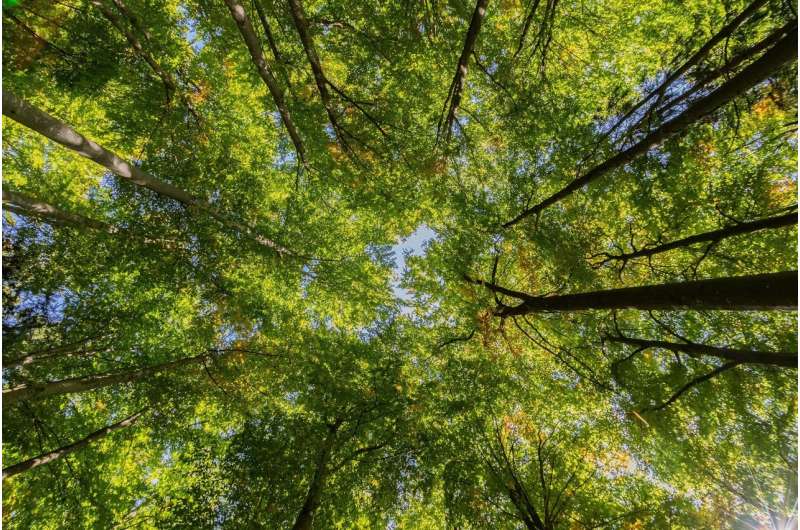The impact of deforestation and afforestation on the global water cycle
An international team of researchers has attempted to assess the impact of both deforestation and afforestation on the global water cycle. In their paper published in the journal Nature Geoscience, the group analyzes precipitation records along with hydrologically weighted leaf area indices to measure changes in surface water over a multiyear period.
As climate change progresses, researchers have made efforts to capture some of the carbon in the air by planting trees. Prior research has suggested that when large numbers of trees are planted in a given area, there is an impact on the water table due to the trees pulling water from the ground and the transpiration of water into the air from the trees. In this new effort, the researchers wondered what sort of impact deforestation and afforestation are having in a more global context.
The researchers gathered and studied precipitation data from several sites around the world. They also studied leaf cover to measure where tree growth in given areas has increased, decreased or stayed the same. From these two factors, the researchers found that they were able to make associations between changes in tree cover and changes in the amount of surface water.
More specifically, they found that changes in vegetation cover over the years 2001 to 2018 led to a global increase in surface water availability of approximately 0.26 mm yr−2. And that increase led to attenuation of approximately 15% of the overall decline in water availability globally. They also found that the increase was due to more rainfall than evapotranspiration for approximately 53% of global land surface.
The researchers also found that the impact on the water table varied by region. In some places, adding more trees increased water availability both locally and in more distant in places downwind. In other places, there was little local impact. They even found places where adding trees did not produce any measurable increases in available surface water.
The researchers suggest that entities involved in deforestation and afforestation projects need to take a closer look at the impact their efforts might have on the water table.
More information:
Jiangpeng Cui et al, Global water availability boosted by vegetation-driven changes in atmospheric moisture transport, Nature Geoscience (2022). DOI: 10.1038/s41561-022-01061-7
© 2022 Science X Network
Citation:
The impact of deforestation and afforestation on the global water cycle (2022, November 1)
retrieved 1 November 2022
from https://phys.org/news/2022-11-impact-deforestation-afforestation-global.html
This document is subject to copyright. Apart from any fair dealing for the purpose of private study or research, no
part may be reproduced without the written permission. The content is provided for information purposes only.

An international team of researchers has attempted to assess the impact of both deforestation and afforestation on the global water cycle. In their paper published in the journal Nature Geoscience, the group analyzes precipitation records along with hydrologically weighted leaf area indices to measure changes in surface water over a multiyear period.
As climate change progresses, researchers have made efforts to capture some of the carbon in the air by planting trees. Prior research has suggested that when large numbers of trees are planted in a given area, there is an impact on the water table due to the trees pulling water from the ground and the transpiration of water into the air from the trees. In this new effort, the researchers wondered what sort of impact deforestation and afforestation are having in a more global context.
The researchers gathered and studied precipitation data from several sites around the world. They also studied leaf cover to measure where tree growth in given areas has increased, decreased or stayed the same. From these two factors, the researchers found that they were able to make associations between changes in tree cover and changes in the amount of surface water.
More specifically, they found that changes in vegetation cover over the years 2001 to 2018 led to a global increase in surface water availability of approximately 0.26 mm yr−2. And that increase led to attenuation of approximately 15% of the overall decline in water availability globally. They also found that the increase was due to more rainfall than evapotranspiration for approximately 53% of global land surface.
The researchers also found that the impact on the water table varied by region. In some places, adding more trees increased water availability both locally and in more distant in places downwind. In other places, there was little local impact. They even found places where adding trees did not produce any measurable increases in available surface water.
The researchers suggest that entities involved in deforestation and afforestation projects need to take a closer look at the impact their efforts might have on the water table.
More information:
Jiangpeng Cui et al, Global water availability boosted by vegetation-driven changes in atmospheric moisture transport, Nature Geoscience (2022). DOI: 10.1038/s41561-022-01061-7
© 2022 Science X Network
Citation:
The impact of deforestation and afforestation on the global water cycle (2022, November 1)
retrieved 1 November 2022
from https://phys.org/news/2022-11-impact-deforestation-afforestation-global.html
This document is subject to copyright. Apart from any fair dealing for the purpose of private study or research, no
part may be reproduced without the written permission. The content is provided for information purposes only.
